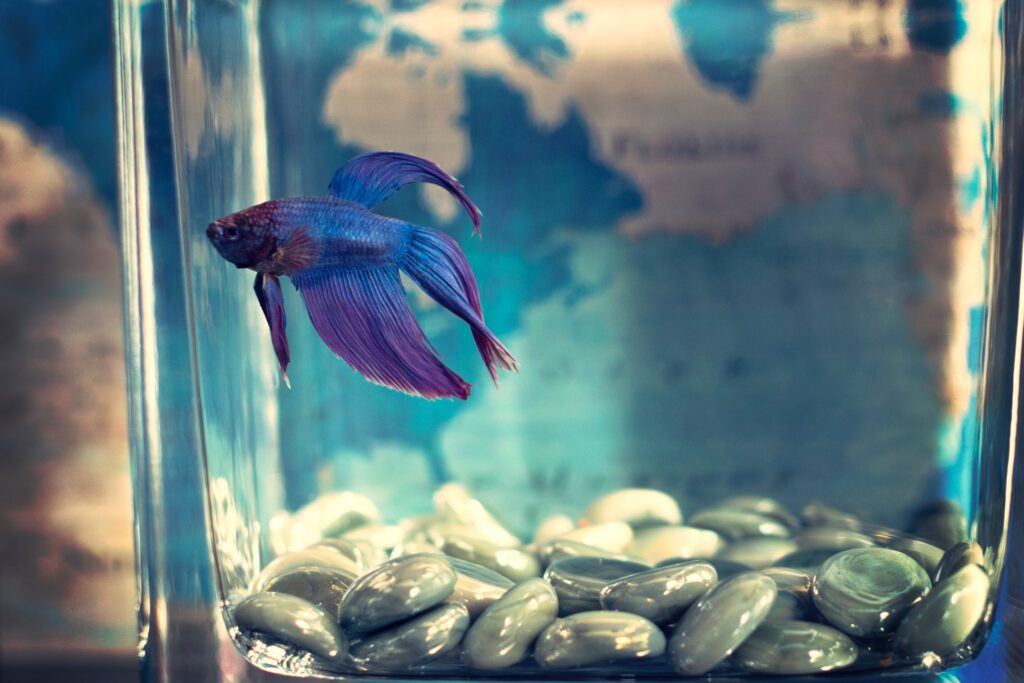
Anxiety and stress are normal reactions to specific overwhelming or unexpected stimuli in our lives. But it’s when they’re ever-present and invasive that they become a real issue.
Having a prolonged activation of the stress response can actually be harmful to the body. It can compromise your immune system and your cardiovascular system.
With a compromised immune system, you may end up sick more often due to stress. Obviously this can cause aches and pains and general unpleasant bodily feelings. The cardiovascular risks are perhaps more daunting long-term, but serious heart troubles might start due to stress and anxiety.
The key to eliminating pain associated with stress and anxiety is to get to the root of the issue and reduce the frequency of the stressors that negatively impact your life. Interestingly, one of the many ways to do this is by getting pet fish.
How and Why Stress and Anxiety Cause Pain
For many people, stress is such a normal part of life that they really don’t even notice it as a problem until symptoms start occurring.
The Body’s Response to Stress
There is a chemical reaction that happens in the body when it perceives something as a danger. This is commonly known as the “fight-or-flight” response. This is the body’s subconscious way of keeping you safe.
The downside with this response is that the body isn’t always able to tell the difference between things that are actually life-threatening and things that are just embarrassing or annoying in your everyday life.
The body will use this response in any situation that is stressful, like a job interview, for example. This creates an increase in heart rate and blood pressure, as well as causes the muscles to tighten.
Physical Symptoms of Stress
Headaches and sore muscles are one of the biggest pain-related side effects of stress and anxiety.
Because stress can cause muscles to become tense, frequent occurrences can lead to tension headaches and sore shoulders, neck, and back. an individual tends to start experiencing tension. This is especially likely to happen in the shoulders, neck and back.
Stress and anxiety can also keep a person from being able to turn their mind off and calm down. This makes it especially difficult to fall asleep at night, leading to insomnia. Insomnia leads to lower energy levels, headaches, and a decreased ability to calmly deal with whatever it is that is causing the stress in the first place.
These prolonged levels of the release of stress hormone can also lower a person’s immune system. This is because stress actually decreases the body’s white blood cell count, which are needed to fight infections. When the immune system isn’t functioning at its best, frequent viruses such as colds or even infections can occur.
The bottom line is that stress and anxiety work in debilitating ways that can cause serious aches and pains…which often lead to even more stress and anxiety. It’s a painful loop to get stuck in.
How Fishkeeping Reduces Stress and Anxiety
While it may sound like an odd suggestion, there are studies that back up the claim that fish, aquariums, and fishkeeping reduce stress and anxiety.
The subtle sounds of the water, the beautiful colors, and the overall serenity of the tank environment can help to reduce stress and anxiety.
It has been found that exposure to environments that are natural actually provide the body with a calming effect. A study done by the Center for Human-Animal Interaction found that anxiety was reduced by 12 percent when participants were near an aquarium.
Another study done to examine the reactions of people to marine life actually found that people experienced reductions in their heart rate as well as elevated moods.
Owning fish can help expose you to this natural environment anytime you are at home. This will help to keep your heart rate down, as well as helping you to de-stress from the day. The study mentioned found that even just ten minutes of watching the aquarium provided long-term blood pressure and heart rate reductions.
Most importantly, if a home aquarium reduces your stress and anxiety as it has been proven to do, you may experience less physical pain and fewer headaches.
Remember: when stress levels go down, the body won’t feel as though it is in “fight-or-flight” mode. This will help the muscles to release tension, helping to reduce the amount of headaches and upper body pain, and helping the immune system to go back to functioning at a higher level.
Quick Intro to Fishkeeping
So how do you get started fishkeeping?
There are plenty of blogs, Youtube channels, and forums out there, so you should easily be able to find what you’re looking for. However, the basics are like this.
- Decide where to put the tank.
- Choose how big you want your tank to be, and make the purchase. Surprisingly, the bigger it is, the easier it is to manage!
- Get accessories like filters and pumps.
- Add water, plants, gravel, and ensure water chemistry is right.
- Choose your fish and add them to the tank when it’s safe to do so.
- Feed a natural, high-quality food.
- Watch your fish regularly and reduce your stress and anxiety!
By Matt Leighton, VIVOFISH.com
